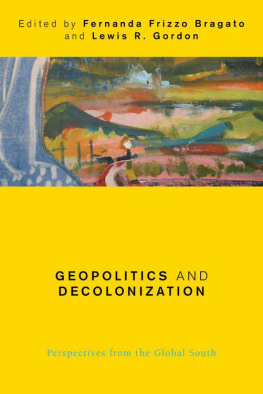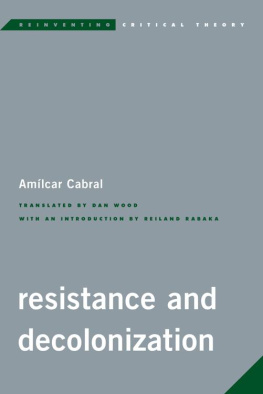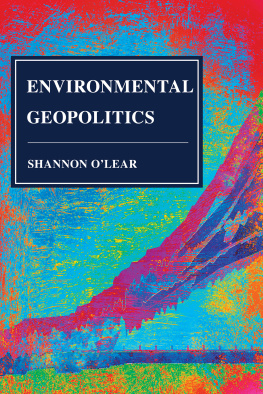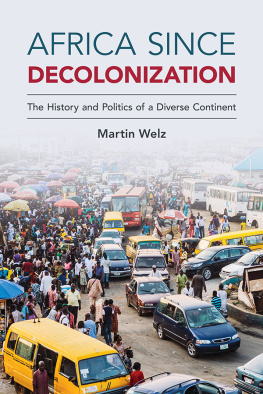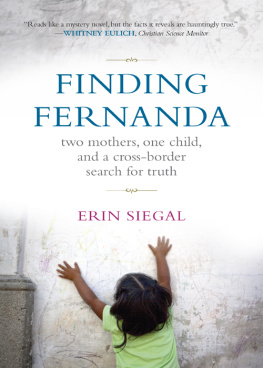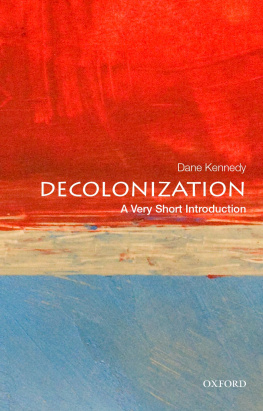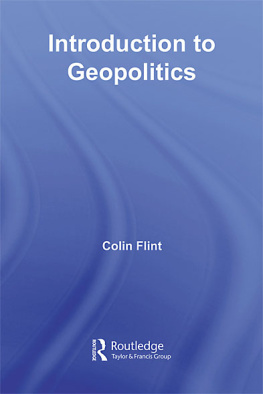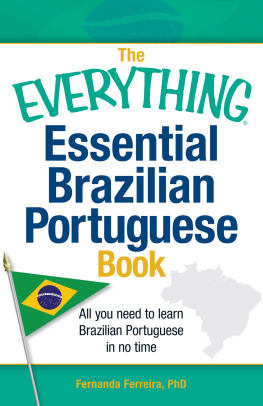Fernanda Frizzo Bragato - Geopolitics and Decolonization
Here you can read online Fernanda Frizzo Bragato - Geopolitics and Decolonization full text of the book (entire story) in english for free. Download pdf and epub, get meaning, cover and reviews about this ebook. year: 2017, publisher: Rowman & Littlefield, genre: Politics. Description of the work, (preface) as well as reviews are available. Best literature library LitArk.com created for fans of good reading and offers a wide selection of genres:
Romance novel
Science fiction
Adventure
Detective
Science
History
Home and family
Prose
Art
Politics
Computer
Non-fiction
Religion
Business
Children
Humor
Choose a favorite category and find really read worthwhile books. Enjoy immersion in the world of imagination, feel the emotions of the characters or learn something new for yourself, make an fascinating discovery.
- Book:Geopolitics and Decolonization
- Author:
- Publisher:Rowman & Littlefield
- Genre:
- Year:2017
- Rating:4 / 5
- Favourites:Add to favourites
- Your mark:
- 80
- 1
- 2
- 3
- 4
- 5
Geopolitics and Decolonization: summary, description and annotation
We offer to read an annotation, description, summary or preface (depends on what the author of the book "Geopolitics and Decolonization" wrote himself). If you haven't found the necessary information about the book — write in the comments, we will try to find it.
Geopolitics and Decolonization — read online for free the complete book (whole text) full work
Below is the text of the book, divided by pages. System saving the place of the last page read, allows you to conveniently read the book "Geopolitics and Decolonization" online for free, without having to search again every time where you left off. Put a bookmark, and you can go to the page where you finished reading at any time.
Font size:
Interval:
Bookmark:
Global Critical Caribbean Thought
Series Editors
Lewis R. Gordon, Professor of Philosophy, UCONN-Storrs, and Honorary Professor, Rhodes University, South Africa
Nelson Maldonado-Torres, Associate Professor of Latino and Caribbean Studies, Rutgers, School of Arts and Sciences
Jane Anna Gordon, Associate Professor of Political Science, UCONN-Storrs
Titles in the Series
Race, Rights and Rebels: Alternatives to Human Rights and Development from the Global South
Julia Surez Krabbe
Decolonizing Democracy: Power in a Solid State
Ricardo Sanin-Restrepo
Geopolitics and Decolonization: Perspectives from the Global South
Edited by Lewis R. Gordon and Fernanda Bragato
The Existence of the Mixed Race Damns: Decolonialism, Class, Gender, Race
Daphne V. Taylor-Garcia
The Desiring Modes of Being Black: Literature and Critical Theory
Jean-Paul Rocchi
Decrypting Power
Edited by Ricardo Sann-Restrepo
Looking Through Philosophy in Black: Memoirs
Mabogo Percy More
Black Existentialism: Essays on the Transformative Thought of Lewis R. Gordon
Edited by danielle davis
Perspectives from the Global South
Edited by
Fernanda Frizzo Bragato and Lewis R. Gordon

London New York
In this book, the term nigger was included in quotations from sources that used this term to maintain the style and language of the source material.
Published by Rowman & Littlefield International, Ltd.
6 Tinworth Street, London SE11 5AL, United Kingdom
www.rowmaninternational.com
Rowman & Littlefield International Ltd.is an affiliate of Rowman & Littlefield
4501 Forbes Boulevard, Suite 200, Lanham, Maryland 20706, USA
With additional offices in Boulder, New York, Toronto (Canada), and Plymouth (UK)
www.rowman.com
Copyright 2018 Fernanda Frizzo Bragato and Lewis R. Gordon
Copyright in individual chapters is held by the respective chapter authors.
All rights reserved. No part of this book may be reproduced in any form or by any electronic or mechanical means, including information storage and retrieval systems, without written permission from the publisher, except by a reviewer who may quote passages in a review.
British Library Cataloguing in Publication Data
A catalogue record for this book is available from the British Library
ISBN: HB 978-1-78660-512-2
ISBN: PB 978-1-78661-088-1
Library of Congress Cataloging-in-Publication Data is Available
ISBN 978-1-78660-512-2 (cloth: alk. paper)
ISBN 978-1-78661-088-1 (paper: alk. paper)
ISBN 978-1-78660-513-9 (electronic)
 The paper used in this publication meets the minimum requirements of American National Standard for Information SciencesPermanence of Paper for Printed Library Materials, ANSI/NISO Z39.48-1992.
The paper used in this publication meets the minimum requirements of American National Standard for Information SciencesPermanence of Paper for Printed Library Materials, ANSI/NISO Z39.48-1992.
Fernanda Frizzo Bragato and Lewis R. Gordon
Fernanda Frizzo Bragato
Lewis R. Gordon
Xavier Alb, Translated by Pedro Bigolin Neto
Jean-Bosco Kakozi Kashindi, Translated by Ana Carolina Voges De Campos
Mbuyi Kabunda Badi
Andr Leonardo Copetti Santos and Doglas Csar Lucas
Gladys Lechini
Eduardo Devs-Valds
Germain Ngoie Tshibambe
Leonel Severo Rocha and Aleteia Hummes Thaines
Csar Augusto Baldi and Enzo Bello
Jocelyn Getgen Kestenbaum
Csar Ross
Introduction
Fernanda Frizzo Bragato and Lewis R. Gordon
The community of scholars gathered here points both to the admission of and a commitment to the construction of a pluriversal world. Among the many consequences of Euro-modernity has been the confusion of universality with the human world onto which it is imposed. We specifiy Euro-modernity because the confusion of European civilizations with modernity is part of such imposition.
The epoch of conquest and colonization affecting the globe since the fifteenth century marked the transformation of Christendom from the northern shores of the Mediterranean upward into Europe and a worldview that once stood in relation, albeit conflictual, with Judaism and Islam into a model of monotheism that was also politically monolithic. The impact of such events is well chronicled in scholarship on modernity, but what often is overlooked is the internal logic of modernist modes of governing and the debates they stimulate among those they both colonize and govern.
All modern forms of imposition are announcements also on who, in effect, belongs to the future of humankind. The result is not only the creation of the modern and the non- or premodern, but also a debate and struggle on who will inhabit the future and how they would do so. In the past, such imposition and resistance presumed achieving membership in the dominant society through adoption of its practices. Thus, ancient Egyptians offered a path through their laws and customs, and so did groups ranging from Babylonians to those in the various dynasties of what today is known as China. The ancient Hellenic empires and subsequent Roman one posed similar concerns as those they conquered and colonized struggled with becoming Greek or Roman or some hybrid version. The later transformation of Rome into the Holy Roman Empire and the later monumental shifts in the conquest of the Americas changed these forms of modernization as the anthropology of membership became racialized.
The Holy Roman Empire marked Christendom as its domain. This religious and theological imperial world met its main challenge in the seventh century in the emergence of Islam. The result was eight hundred years of Afro-Muslim rule of the Iberian Peninsula in the form of an Islamic center known as Andalusia. During those years of Andalusian rule, Christendom wasnt short of pejorative terms for its outsiders, and among them was the term raza, which, in addition to referring to breeds of dogs and horses, identified Jews and Moors (Afro-Muslims). The anthropology in those years were theonatural, by which we mean placing the natural in the sphere of Christian normativity. To be truly human meant to be Christian. When Christendom reconquered the peninsula in January 1492, the conflict took to the Atlantic Ocean at the other side of which Columbus landed in October of the same year, marking a radical shift in the world as Christians knew it and those who greeted them in the Caribbean and then throughout what subsequently became the Americas.
A peculiar conflict emerged from the fifteenth century onward. Previous conceptions of what it meant to be modern were then transformed through the racial addition. What resulted was not simply who belonged to the future through joining the colonizing society, but also who belonged to humanity. People who were not Christians, Jews, or Moors had to be accounted for with the presumption at first that becoming Christian was their only path into the properly human world. What was to become of them outside the triad of Christian, Jew, and Moor, especially when the only place for them in the future was supposedly Christian? Belonging properly to the past, the so-called primitive was born. A new question was thus posed to those colonized and conquered. How, they began to ask, could they inhabit the future when the properly human was predicated on their absence? Worse, the modes of differentiation began to change from the theonatural into the natural. Different terms began to evolve as Christian increasingly became European, and the latter, white. Euro-modernity became white supremacy.
Font size:
Interval:
Bookmark:
Similar books «Geopolitics and Decolonization»
Look at similar books to Geopolitics and Decolonization. We have selected literature similar in name and meaning in the hope of providing readers with more options to find new, interesting, not yet read works.
Discussion, reviews of the book Geopolitics and Decolonization and just readers' own opinions. Leave your comments, write what you think about the work, its meaning or the main characters. Specify what exactly you liked and what you didn't like, and why you think so.

